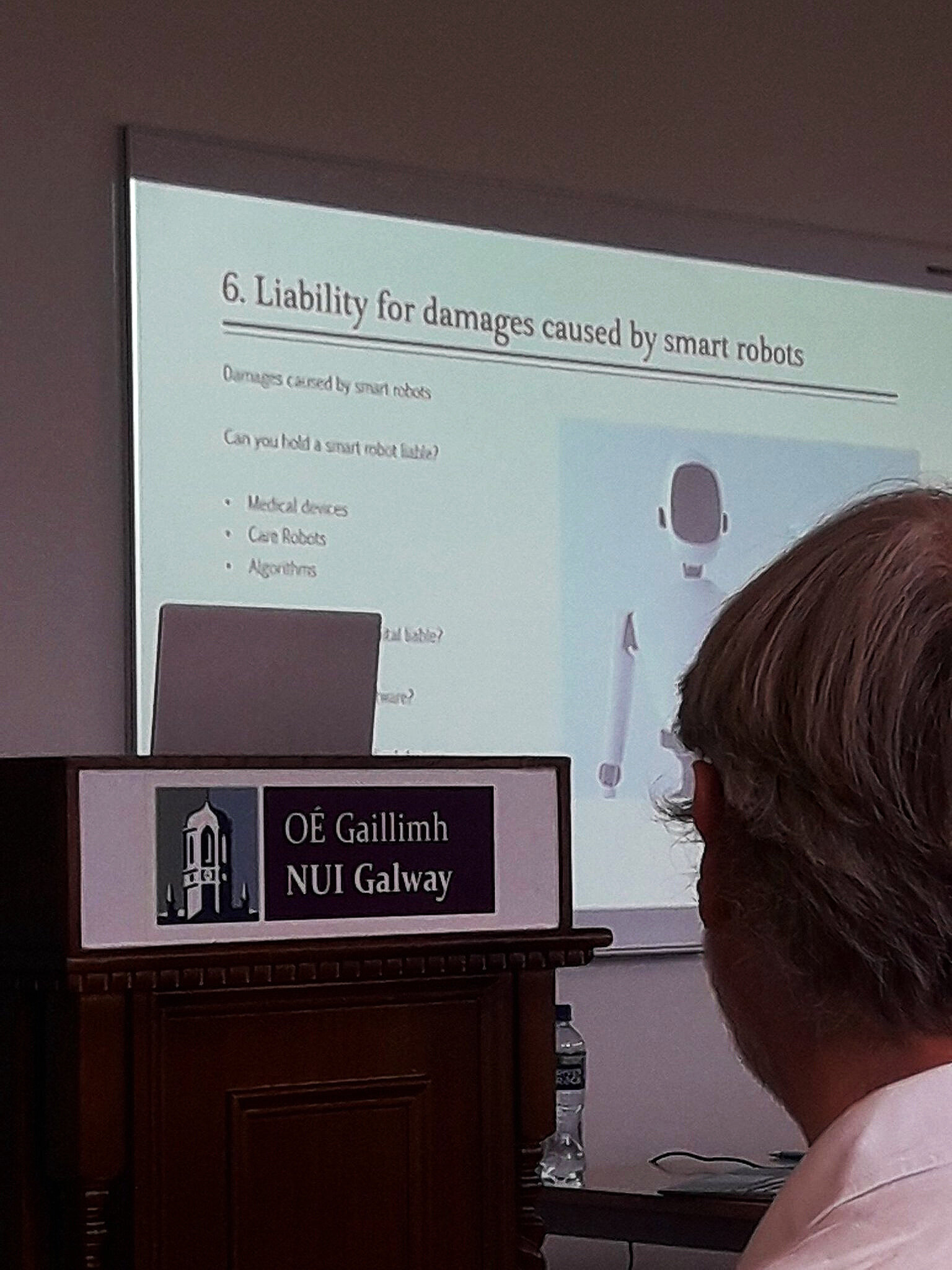Suzan Slijpen Conference Speaker at the National University of Ireland
Legal Aspects of AI in Healthcare
On 16 August 2019, Suzan Slijpen LL.M. had the honour to speak about the legal aspects of the development and use of artificial intelligence (a disruptive technology) in healthcare, at the AI in Medicine Conference organized by the Irish Association of Physicists in Medicine (IAPM). The conference took place in Galway, at the National University of Ireland (School of Physics, NUI Galway/ OÉ Gaillimh). Suzan is a senior legal consultant at AIRecht.nl, and specializes in eHealth & medical devices, pharmaceutical law, European food law and contract law, from an AI helicopterview. She studied European private law at Utrecht University and was awarded with the prestigieus Molengraaff Institute prize best thesis of 2015. Suzan is also founder and lawyer at boutique law office Slijpen Legal.
Suzan Slijpen Speaker at the National University of Ireland. Legal Aspects of AI in Healthcare lecture at the AI in Medicine Conference organized by the Irish Association of Physicists in Medicine (IAPM). Photo by Niall Phelan
Key topics of the Artificial Intelligence in Medicine lecture
The key topics that Suzan addressed in her Artificial Intelligence in Medicine lecture, from a legal perspective are:
1. AI & Robotics: Disruptive Technologies
Synergetic effects of 4th Industrial Revolution technologies like robotics, big data, quantum computing, Blockchain, Virtual Reality (VR) and Internet of Things (IoT): interconnectivity of smart online products and autonomous machines.
2. eHealth and medical devices
Medical devices: legal classification, Carebots, Medical software, eHealth apps and Personalized medicine.
3. Fundamental Rights
Safeguarding of Fundamental Rights in AI applications, Rights of Patients, Ownership of Data, Privacy by Design.
4. Ethics and Responsible AI
1791 French Revolution Values, HLEG: Concept of Trustworthy AI, Security and Safety by Design
5. Intellectual Property on AI and Health Apps
Maximize your Intellectual Property. Owner = human or company (legal entity), Copyrights on software and medical apps, Patents on AI invention and smart robots, Trade secrets, Which legal system – different rules apply, Licensing your IP.
6. Liability for damages caused by smart robots: who is liable for misdiagnosis by an AI algorithm?
Can you hold a smart robot liable?
• Medical devices
• Care Robots
• Algorithms
Is the doctor or the hospital liable for damages caused by an AI, or the manufacturer of the software? Indemnification for medical devices, Insurance problems and opportunities? What is the legal status of robots in healthcare?
7. Legislation and Jurisprudence
European Commission - EU AI laws (fall 2019), European AI Alliance gives input to EC’s Ethical and Legal Code, AI lawmaking is difficult: many variables for new EU regulatory framework, Legal uncertainty, Legislation versus self-regulation, best practices and industry-specific governance codes of conduct.
8. AI Impact Assessment: remove roadblocks for AI
Remove barriers for adoptation of AI in Healthcare. Unique (Dutch) guide for responsible and safe development and implementation of artificial intelligence, Roadmap + Checklist, Code of Conduct Artificial Intelligence, Risk assessment tool, IEC / ISO / NEN norms, ISO SC 42 standardisation of AI, CE-mark for products in EU market.
Handout and questions workshop participants
Participants of the workshop received a handout and could ask questions about legal and ethical aspects of AI and data, IP rights, privacy and liability. Some feedback on the lecture included:
“Suzan Slijpen provides excellent insight into legal and ethical aspects of AI in medicine!”
Workshop sessions and speakers
The Irish Association of Physicists in Medicine (IAPM) invited 6 speakers to the Artificial Intelligence Workshop:
1. Computer Vision for AI Based Medical Diagnosis by Prof. Paul Whelan, Full Professor of Computer Vision, Vision Systems group Dublin City University.
2. AI in Radiology: A Clinical Perspective by Dr. Declan Sheppard, Clinical Director of Radiology University Hospital Galway.
3. DIY: Easy 3 Steps to Build a Deep Learning Model for Medical Imaging Data by Zenodia Charpy, Data Scientist Advanced Data & AI team, Microsoft.
4. Legal Aspects of AI in Healthcare by mr. Suzan Slijpen LL.M, Senior Legal Consultant at Artificial Intelligence & Law, Consultancy Firm Amsterdam, The Netherlands.
5. How to bring AI/radiomics based solutions faster and smarter to the clinic by Dr. Sean Walsh, Chief Science Officer at Oncoradiomics.
6. AI and Smart Sensors in Cardiometabolic Health by Dr. Atif Sharif, Associate Director of the Smart Sensors Lab at National University of Ireland, Galway.
The workshop at NUI Galway was concluded with an open forum an a panel for remaining questions by the audience.
NUI Galway/ OÉ Gaillimh
Many thanks to the IAPM, the NUI Galway/ OÉ Gaillimh and especially to Matthew Donoghue (Chair, Medical Physicist Department of Medical Physics and Clinical Engineering, Galway University Hospitals, Saolta University Health Care Group) and his team for inviting us!
Legislation and regulations regarding AI in Healthcare
Do you want to know more about legislation and regulations regarding AI in Healthcare, or Legal aspects of disruptive tech in Medicine? Or do you want to organize a workshop or conference yourself and invite us as a speaker or teacher? Then please contact us about the possibilities!
Artificiële Intelligentie & Recht (AI and Law) is a leading 4th Industrial Revolution legal consultancy firm with a focus on transformative innovation technology such as AI, quantum, cybersecurity, smart robotics, computational ethics, big data & predictive analysis, blockchain and machine learning implementations, with double educated lawyers & technologists specializing in sectors such as the Pharmaceutical, eHealth, Medical Device, AgriFood & Feed, Consumer Electronics, Marketing, Retail, Energy, Transportation & Logistics, Travel, Automotive and Entertainment industries. Our AIRecht legal professionals work in the nexus of AI & Law, maximize your intellectual property, perform due diligence and conformity assessments and make certain your company or organization complies with the law, such as the EU AI Act, the Data Governance Act and the GDPR, ensuring sustainable disruptive growth. Legal pioneers in deep learning, smart contracts, augmented reality and cognitive computing. Daiki is our partner for EU AI Act Compliance through its patented AI Model Registry.



